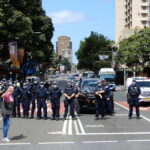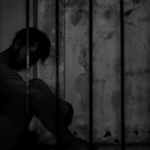What is the Rule of Law?

The rule of law is a term that was first coined by Oxford law professor Albert V Dicey in 1885.
In general terms, it’s the principle that law should govern a nation, and both the government and individuals are equally subject and accountable to the law. It is meant to protect against the arbitrary use of power, to promote transparency and make those in positions of power such as police and government officials accountable for their actions.
Essential to the rule of law are key aspects such as equality before the law, and that laws are rational, known, and publicly made. The law must be enforced by an independent court system, and persons are to be presumed innocent until proven otherwise.
The concept that the law applies equally to everyone, including the powerful, was first established under the document known as the Magna Carta in 1215. That document was issued by King John of England as a peace treaty with barons, who were rebelling against his authoritarian rule.
The document spoke of the right to due process, and paved the way for trial by jury – both fundamental elements of the rule of law. And today, the protection of universal human rights is an integral part of what the rule of law upholds.
The rule of law was instituted at the international level in 1945, when it was enshrined within the Charter of the United Nations: the foundational treaty of the organisation.
On 30 November 2012, the UN General Assembly issued a declaration whereby member states affirmed their commitment to the rule of law, and pledged to strengthen it.
Global rule of law rankings
The World Justice Project (WJP) is an independent organisation that works to promote the rule of law globally.
The WJP Rule of Law Index is a quantitative assessment tool that offers a “comprehensive picture of the extent to which countries adhere to the rule of law in practice.”
To assess the adherence of countries, the index takes into account nine factors: constraints on government powers, absence of corruption, open government, fundamental rights, order and security, regulatory enforcement, civil justice, criminal justice and informal justice.
The 2016 Rule of Law Index ranked 113 countries. The Western European and North American region accounted for eight of the top ten countries. Denmark was the highest-ranking country in the world, followed by Norway. The United States came in at eighteenth.
East Asia and the Pacific region was the second-ranked region in the world. New Zealand came in at number eight, and Singapore was number nine. As for Australia, we ranked at number eleven, which was down from number ten the previous year.
Looking at countries where the rule of law seems a bit flimsy, the bottom five were Cameroon, coming in at 109th, followed by Egypt, Afghanistan, and Cambodia, while the country that ranked last on the list was Venezuela.
Outside the rule of law
Of course, there are regions of the world occupied by forces that aren’t members of the United Nations, and nor are they a party to its conventions. And these areas are often held by armed groups that are said to exist outside the rule of law.
Take the Islamic State. The self-proclaimed caliphate has controlled a large region within Iran and Syria, although it’s fast losing that area. It’s classed as a terrorist organisation. And the US defence department defines terrorism, as the “unlawful use of violence or threat of violence.”
But, as Yale University political science PhD candidate Mara Revkin points out in a 2016 paper, although groups like the Islamic State carry out actions that are unlawful, they often claim to be following their own legal systems.
The Islamic State has established a legal system within the region it controls based not only on the seventh century caliphate, but also on modern rules and regulations that govern a twenty first century state. Ms Revkin lists the issuing of traffic fines and traffic safety rules as examples.
According to Revkin, there’s growing research into what’s known as “rebel governance.” And armed non-state groups “are much more rule-abiding and rule-creating” than previously recognised. Other examples of such groups are FARC in Colombia and the Maoist insurgency in India.
However, these systems of rebel governance hardly fall within the parameters of the UN-sponsored rule of law that had its inception in the Magna Carta.
Whittling away at the rule of law
Over recent years, the NSW government has enacted a series of laws in the name counterterrorism and organised crime, which have been steadily eroding citizen’s basic rights. And since these rights are upheld by the rule of law, these state laws might be seen to be undermining the principle.
NSW police now have the power to shoot to kill without fear of prosecution at incidents deemed a terrorist act. Individuals can be banned from a place or an event for up to 72 hours a week, under the provisions of public safety orders that can be issued by senior police without court oversight.
Terror suspects, as young as 14, can be held in investigative detention for up to 14 days without charge. While a series of anti-protests laws that were passed last year dramatically increased police powers to counter public protests aimed at mining operations.
In 2016, NSW Chief Justice Tom Bathurst remarked that he’d counted 397 encroachments upon three legal protections alone in this state: the presumption of innocence, the right against self-incrimination and client legal privilege.
A bill of rights
Australia is the only democratic nation in the world without a national bill of rights. Such a bill would protect citizens’ rights under the law, and guard against the government enacting laws that infringe upon basic freedoms.
As UNSW professor George Williams told Sydney Criminal Lawyers® last month “parliaments are no longer exercising the sort of self-restraint they have in the past about democratic rights, particularly freedom of speech, but also association.”
The professor further explained that while nations like the United States and the UK have also enacted tighter security laws over the last decade, the volume of laws passed in Australia is far greater, and key aspects of the laws go further.
In 2004, the ACT became the first jurisdiction in Australia to enact a bill of rights. And Victoria followed suit two years later. Currently, there’s a push to establish similar bills at the state level in NSW and Queensland.
However, a national bill of rights would ensure the rights of Australians under all federal, state and territory laws. Indeed, legislating nationally for the protection of freedoms in this country would guarantee that the rule of law was not only upheld, but it would also be strengthened.






